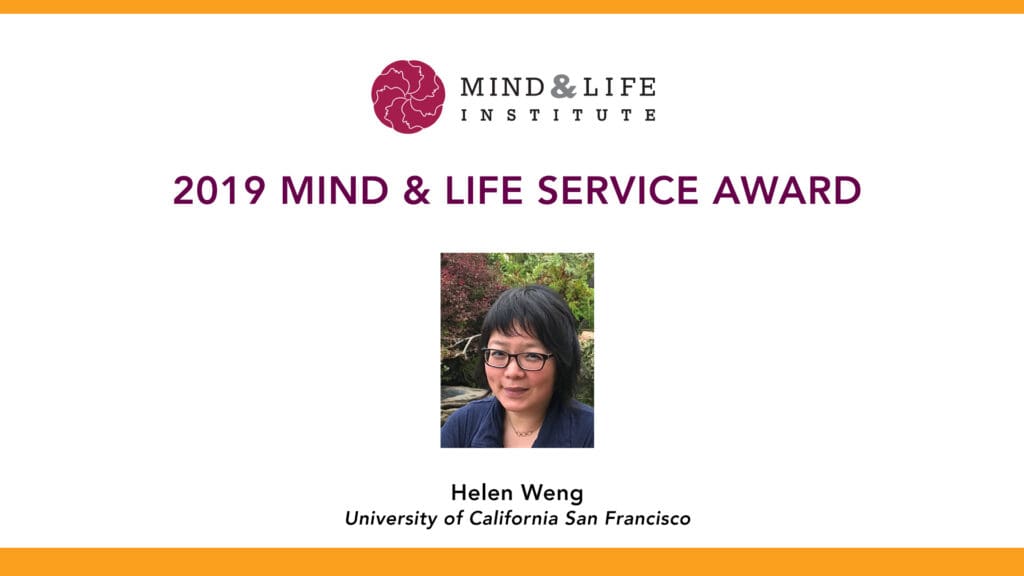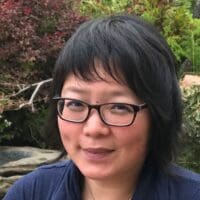
In late 2019, Helen Weng, PhD was honored with the Mind & Life Institute Annual Service Award. The award is given to individuals who are distinguished by the breadth and depth of their involvement with Mind & Life, and who embody its core values of compassion, integrity, curiosity, inclusion, and excellence. Below is a tribute to Dr. Weng, who will be formally acknowledged at Mind & Life’s Contemplative Research Conference in November 2020.
Growing up on Long Island, New York, Helen Weng remembers being teased as one of the few racial minorities in her community. The daughter of Taiwanese immigrants, as a teenager she took comfort in books by the Dalai Lama. So began her interest in the study of compassion and contemplative practice, an interest that would drive her later work as a clinical psychologist and neuroscientist.
“Compassion helped to ground me, to give me comfort, and understand where other people are coming from,” says Weng, now Assistant Professor of Psychiatry at the University of California-San Francisco and a research faculty member at the Osher Center for Integrative Medicine. For 15 years, her research has largely focused on how to measure the impact of contemplative practice on our relationship to ourselves and others.
“People aren’t trained to cultivate positive relationships,” she says. “While we know the steps needed to buy a car, the same isn’t true for building healthy relationships at home and in the world,” she adds. Using practices related to mindfulness, awareness, and compassion can help.
Weng’s first exposure to Mind & Life came in 2006, at the end of her first year in graduate school studying with Dr. Richard Davidson at the University of Wisconsin-Madison, when she attended the Summer Research Institute (SRI). Immediately, she found herself drawn to the bringing together of people from different backgrounds and perspectives—scientists, clinicians, contemplative practitioners, students, and teachers—“to chew on an issue.”
She’s returned to the SRI almost every year since. “I like to say Mind & Life academically raised me,” she shares. “It felt like everyone was really committed to the mission of how these practices can help ease suffering and how to go about measuring this scientifically.”
“I like to say Mind & Life academically raised me.”
Over time, her engagement with Mind & Life only deepened. In 2012, Weng was selected as a Mind & Life Fellow. She has not only presented at numerous events, but has served as a long-time grant reviewer, and as a founding member of the Council for Equity, Diversity, and Inclusion.
Says Mind & Life President Susan Bauer-Wu, “Helen has had an incalculable impact on our work, not only through her research and countless volunteer hours, but her commitment to advancing the principles of equity, diversity, and inclusion both within Mind & Life and across the field of contemplative science.”
When asked what questions keep her up at night, Weng is quick to respond. “Mostly, it’s scientific challenges around how to measure things.” In 2006, she received a Francisco J. Varela Research Grant to study the impact of contemplative compassion practice on brain and prosocial behavior. Using neuroscience and functional magnetic resonance imagining (fMRI), she set out to explore whether and how “inner practice translates into outer changes.” Study participants were asked to generate compassion towards pictures of people suffering. For two weeks, each practiced compassion meditation for 30 minutes a day.
“A common reaction to encountering other people’s suffering is to feel sad, to be reactive, or to turn the other way,” Weng explains. By contrast, meditation practice can help individuals non-judgmentally hold difficult feelings, she adds, while cultivating a desire to ease others’ suffering. The study, carried out at the Center for Healthy Minds at the University of Wisconsin-Madison, found participants were more generous in an economic exchange game after the two-week compassion practice. The more generous they were, the more their brains changed in response to pictures of suffering in regions associated with empathy and emotion regulation.
In a follow-up study, Weng and her colleagues also found that participants who learned compassion could visually attend to images of suffering while dampening responses in the amygdala, a region implicated in negative arousal. This suggests they are able to attend to suffering in a more calm and equanimous way.
Through her next research endeavor, the EMBODY Project, Weng sought to apply new ways of measuring brain activity during contemplative practice. While typically research studies average the brain structure and function of participants, she notes, her study sought to employ individualized methods using pattern recognition, or machine learning.
“Essentially, you let each person’s brain be its own unique environment,” she explains. “You collect data from each person so that computer algorithms can start to recognize mental states for that particular person.” Using pattern recognition technology, the EMBODY Project was able to estimate when meditators were focused on the breath and when they were not. “It’s the first measure to read someone’s mind when they’re meditating moment-by-moment, making an estimate second-by-second of where their attention is,” she says.
In 2015, Weng received a second Varela grant to expand the scope of the EMBODY Project to include a diverse study group. Early in her career, she observed that both researchers and participants in contemplative science studies tended to be white males. The second phase of the EMBODY Project was carried out in collaboration with the East Bay Meditation Center (EBMC), which offers safer spaces for contemplative practice for under-represented populations, including people of color, people with disabilities, and members of the LGBTQ community.
EBMC advised Weng on how to make the study more culturally sensitive, for example, through the language used in recruitment flyers and during interviews. Ultimately, her study involved 15 participants, 80% of whom were racial/ethnic minorities, with 53% representing the LGBTQ+ community. This will likely be one of the most diverse contemplative neuroscience studies.
Using the community engagement method, Weng sought to break down traditional barriers between scientist and research subject. Engaging participants means soliciting their input at various stages in the process and compensating them, either monetarily or through co-authorship and other forms of recognition. “This is how research should be done,” says Weng. “By including those you want to study—and by sharing resources—it’s an embodied act of social activism.”
“This is how research should be done. By including those
you want to study—and by sharing resources—it’s
an embodied act of social activism.”
While there are those that claim studies using machine learning are not rigorous enough, Weng defends the use of statistical methods to honor people’s diversity. “To me it’s more rigorous because you’re measuring the specificity of the person right in front of you,” she says. “It’s the integration of the general, plus the specific, that’s going to lead to better solutions.”
Weng’s next project, for which she received a 2019 Mind & Life PEACE grant, is also being carried out in collaboration with EBMC. She seeks to measure the mental states of diverse study participants practicing loving-kindness meditation. The study will begin with interviews and a qualitative analysis of how participants are meditating and its impact on their lives. “Often scientists don’t talk to the people they’re studying,” she says, adding that “there’s a lot you can learn from interviewing people in a systematic way.”
When it comes to contributing to a more compassionate world, Weng’s work has already started to bear fruit. After completing a study on compassion meditation in grad school, she released the meditation for free. Since then, it’s been downloaded over 30,000 times by people around the world, many for use in clinical applications such as decreasing bias against refugees and helping women with body image disorders.
In recognition of her efforts, in 2019 Mindful Magazine named Weng one of 12 Powerful Women in the Mindfulness Movement. Being outspoken on issues of diversity has come with a price. “It’s been difficult. I’m a person of color so it puts me at risk,” she says. “But it’s been worth it. Researchers are now changing their methods to be more diverse and inclusive. With 40 percent of the U.S. population made up of racial and ethnic minorities, we need to use this work to help as many people as possible.”




